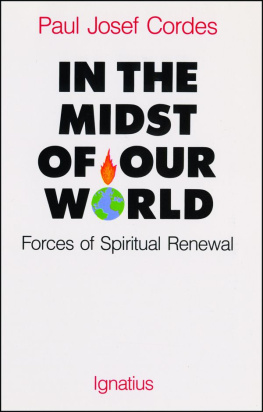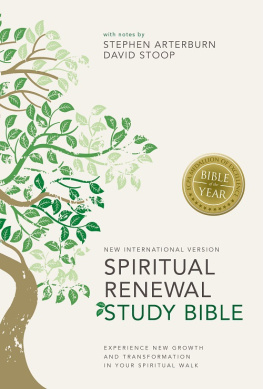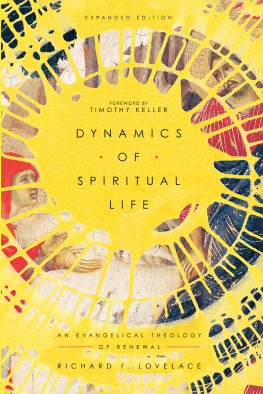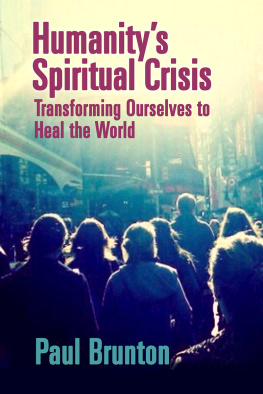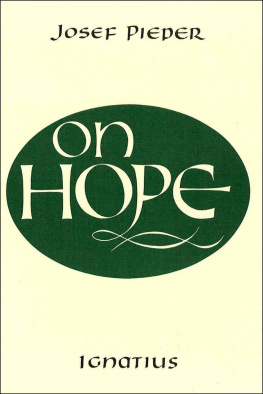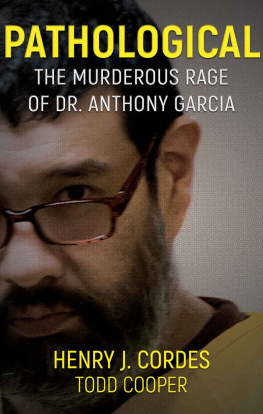Paul Josef Cordes - In the Midst of Our World: Forces of Spiritual Renewal
Here you can read online Paul Josef Cordes - In the Midst of Our World: Forces of Spiritual Renewal full text of the book (entire story) in english for free. Download pdf and epub, get meaning, cover and reviews about this ebook. year: 1988, publisher: Ignatius Press, genre: Religion. Description of the work, (preface) as well as reviews are available. Best literature library LitArk.com created for fans of good reading and offers a wide selection of genres:
Romance novel
Science fiction
Adventure
Detective
Science
History
Home and family
Prose
Art
Politics
Computer
Non-fiction
Religion
Business
Children
Humor
Choose a favorite category and find really read worthwhile books. Enjoy immersion in the world of imagination, feel the emotions of the characters or learn something new for yourself, make an fascinating discovery.
- Book:In the Midst of Our World: Forces of Spiritual Renewal
- Author:
- Publisher:Ignatius Press
- Genre:
- Year:1988
- Rating:3 / 5
- Favourites:Add to favourites
- Your mark:
- 60
- 1
- 2
- 3
- 4
- 5
In the Midst of Our World: Forces of Spiritual Renewal: summary, description and annotation
We offer to read an annotation, description, summary or preface (depends on what the author of the book "In the Midst of Our World: Forces of Spiritual Renewal" wrote himself). If you haven't found the necessary information about the book — write in the comments, we will try to find it.
In the Midst of Our World: Forces of Spiritual Renewal — read online for free the complete book (whole text) full work
Below is the text of the book, divided by pages. System saving the place of the last page read, allows you to conveniently read the book "In the Midst of Our World: Forces of Spiritual Renewal" online for free, without having to search again every time where you left off. Put a bookmark, and you can go to the page where you finished reading at any time.
Font size:
Interval:
Bookmark:
IN THE MIDST OF OUR WORLD
Forces of Spiritual Renewal
PAUL JOSEF CORDES
OF OUR WORLD
Forces of Spiritual Renewal
TRANSLATED BY
PETER SPRING
IGNATIUS PRESS SAN FRANCISCO
Title of the German original:
Mitten in unserer Weit:
Krfte geistlicher Erneuerung
1987 by Verlag Herder GmbH & Co., KG;
Freiburg im Breisgau
Cover by Roxanne Mei Lum
With ecclesiastical approval
1988 Ignatius Press, San Francisco
All rights reserved
ISBN 0-89870-208-9
Library of Congress catalogue number 88-81093
Printed in the United States of America
To all fellow-helpers
and volunteers at the
San Lorenzo International
Youth Center in Rome
CONTENTS
INTRODUCTION
Pope John Paul II chose as the theme of the Synod of Bishops 1987 the Vocation and Mission of the Laity in the Church and in the World, Twenty Years after the Second Vatican Council. In the preparation of this convocation of the worlds episcopate, it became clear that the postconciliar period has witnessed an astonishing upsurge of spiritual forces in the Church.
The climate of the synod itself was determined precisely by the discussions on ecclesial movements. The Synod Assembly, to tell the truth, dwelt less on those associations and groups that already have a well-consolidated experience. The discussion of the new realities of Catholic associations or movements was a different story.
The numerous interventions, made in this regard by the Fathers and the laity in plenary sessions and in the language groups, focused attention more and more on this conciliar and postconciliar phenomenon. Never before had the new ecclesial realities so deeply engaged their supreme leaders. And, if we consider the important role that synods have, in principle, in the orientations of the Church, we must certainly speak of an epoch-making step. All this is a sign of the importance attributed to them throughout the world. It is worthwhile, therefore, to treat these movements in more detail, especially with regard to their pastoral aspect and their theological inspiration.
Since 1979 the Pontifical Council for the Laity has invited men and women lay leaders in all continents, together with their pastors, to a series of meetings that have served a useful role both for the exchange of views and for more effective cooperation in the field of the lay apostolate. These meetings, like many other contacts and discussions, have shown that new spiritual ferments are to be felt in many local churches: those that have evidently reacted more promptly and sensitively to contemporary processes and the feelings of people in our time, and perhaps also those who ecclesial structures have not stood in the way of the new lay movements or at least have restricted them less. In any case, the phenomenon of the new spiritual ferments needs to be thoroughly examined, not only with a view to its theological elucidation and greater stability, but more especially because the spiritual movements make a contribution to the fulfillment of the Churchs mission that can hardly be overestimated. Why this should be so can briefly be outlined.
1. Our faith in God is characterized by the greater trust and fidelity we display in our daily life. Yet this sense of trust in our familiar everyday life is deepened as soon as God goes beyond the familiar impulses of ordinary Christian life and places signs of his presence in the midst of our world. Someone who has concluded that God, as a result of his sometimes painful silence, is a distant, unapproachable being, then discovers to his surprise that if we give ourselves to God, he awakens new life in us through the Holy Spirit. New joy in the Gospel leads to a new willingness to help each other and serve the Church and our fellow-men. This dedication and commitment on behalf of all our fellowmen, assumed in diversity and unity, bring those who are seeking and those alienated from God to the realization: God is among you indeed (1 Cor 14:25).
2. This certainty of Gods presence among us becomes all the more crucial in the face of the experience of the various criticisms leveled against the Church and also in the face of the questions posed by her own members and modern man about meaning and mission. Quite clearly the various new spiritual movements that have emerged in our time build bridges capable of closing the temporal gap between the salvific deeds of Jesus and our unredeemed age. Through concrete impulses of Christian piety and corresponding forms of Christian praxis, they offer relevant aids for the pursuit of the faith in our time. Revelation is given an appealing face, once again inviting us to action. Thanks to the spiritual movements, moreover, the Gospel is constantly rejuvenated; it leads to personal meeting with the Lord and, through imitation of him, to dedication to the Father.
3. Christians who bear witness to Gods living presence among us cannot avoid involving themselves in the world and exposing themselves to its power. For the Good News of Jesus demands that it be proclaimed from the housetops (Mt 10:27); it is not something to be hoarded for private edification. And the urge to spread the Good News becomes all the stronger the more the individual is moved by the truth of the Faith: Woe to me if I do not preach the gospel! (1 Cor 9:16).
Spiritual movements have quite unjustifiably been accused of esoteric isolation and apostolic sterility. Yet since the Council they have quite demonstrably prepared the ground for the seed of the Word of God among men in many parts of the world. Since the Gospel is for them the password to a new, hitherto undiscovered land, they cannot but speak (Acts 4:20) of what they have seen and heard. This commitment leads them to speak up for social justice and peace among peopleseven if the means to the achievement of these ends are sought not in political action but by individual conversion: by the conversion of the human heart. Contributions to the transformation of society and the state are thus in no way lacking in the spiritual movements. Moreover, well-informed reports on their various initiatives and plans show that these groups are a good deal less unworldly than they are sometimes accused of being.
4. Service to the Church and to society must be directed by each spiritual community at the particular church to which it belongs. A movements special spiritual endowment absolves neither it nor its individual members from their duties to the parish or other significant Church structures. The diocese and parish form the basic ecclesial structures within which Christian faith and action are appropriately centered: it is in them that our neighbor lives; and it is in them that the hour of truth, the proof of quality, are to be looked for. Otherwise, membership of a spiritual movementand engagement on its behalfwould simply become a form of escape; it would weaken rather than strengthen the ability to lead a Christian life.
It is therefore important to make known the ways in which this mission can be ever more effectively performed to the benefit of the local church and its community. Trust between the members of the movements and their appointed pastor, and mutual deference between them, are thus unvoidable. Only on this assumption will all in common discover the spiritual values and forces capable of being devoted to the service of the community. The members of the movements in fact do make themselves available for particular pastoral tasks: religious instruction for children, adolescents and adults, the encouragement of spiritual activities among members, the arrangement of liturgies and the Divine Offices, concern for religious vocations or the undertaking of charitable and social activities all proclaim what the Spirit says to the churches (Rev 2:7-11).
To ensure that concrete action enduringly preserves its theological and spiritual depth, it is in many places accompanied by formative and educational activities. This conceals a twofold dynamic. First, these activities provide the experience that each community must continuously commit itself to the particular task for which it was originally set up; otherwise the fullness of the Churchs charisms cannot be preserved intact. At the same time, however, it is essential that each group and the cultivation of its spirituality be geared to the patrimony of the Faith as a whole; only in this way can they preserve unity in diversity.
Next pageFont size:
Interval:
Bookmark:
Similar books «In the Midst of Our World: Forces of Spiritual Renewal»
Look at similar books to In the Midst of Our World: Forces of Spiritual Renewal. We have selected literature similar in name and meaning in the hope of providing readers with more options to find new, interesting, not yet read works.
Discussion, reviews of the book In the Midst of Our World: Forces of Spiritual Renewal and just readers' own opinions. Leave your comments, write what you think about the work, its meaning or the main characters. Specify what exactly you liked and what you didn't like, and why you think so.

